|
Note: The names of companies are provided for information purposes only and are not recommendations. We warn you now, this is a very long blog, but it contains a huge amount of useful information. 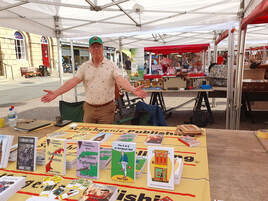 Author Robert Cubitt at Newark Book Festival Author Robert Cubitt at Newark Book Festival One of our authors, Robert Cubitt, has attended several book fairs as a seller this year and learnt quite a few tricks about selling books direct to the public. This blog acts as a “case study” for anyone else who is considering taking this route to sell some of their books. I’m sorry that this blog only relates to UK events, but most of what we talk about can be applied in any country in the world, so it still makes it a worthwhile read. But first of all, a reality check. Book fairs and similar events aren’t going to turn you into a best selling author. All the exhibitors that Bob spoke to while attending these events had the same stories to tell regarding sales volumes.. You may sell a few books and people may search out your books on-line later, but don’t load up a van with hundreds of copies hoping to go home with an empty van because it isn’t going to happen.  But book fairs aren’t just about selling books direct to the public. They are a shop window. Not everyone who looks in a shop widow buys what they see straight away. Sometimes they go home, think about it for a bit and then come back and buy. Obviously, by that time the book fair is over, but there are ways of accommodating that which we will discuss later. Firstly, it is essential to do some research on the fairs you want to attend before you reserve your place. There is usually a contact email address to which you can address questions, but finding out who else has been to them in the past and what experiences they had is also helpful. Not all book fairs are the same. One of the ones Bob attended was aimed mainly at the second-hand book market and it’s pretty hard to sell your book at a profitable price when the stalls around you are selling all their stock at a fraction of what you are charging. It was noticeable from the behaviour of the people attending that they were interested only in bargains. The fair wasn’t an entirely wasted journey, but Bob barely covered his costs.  Some book fairs have speakers or people reading extracts of their work. You could even offer to speak yourself. It almost guarantees sales (but make sure to take someone with you to look after your stall while you are speaking. You don’t want to miss any sales). The next thing to consider is the cost for the “pitch”. Costs range from about £5 at smaller fairs up to £40 or £50 ($35-$45) at the larger ones. For one event, which ran over a weekend, Bob also had to have a hotel room which cost a further £100, plus meals. Including fuel, you can call it a £200 investment for the weekend and you won’t be far out. There were a few other costs, and a we’ll be discussing some of them. 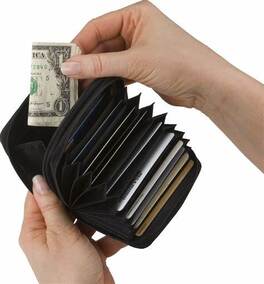 Given what we said about the potential to make sales, it is therefore advisable to work out how many books you would have to sell to recoup your costs, to see if it is worthwhile going. Obviously, the closer you are to the venue, the more profitable it is likely to be. However, a lot of the value in bookfairs isn’t in actual sales. It is part of a marketing strategy and has to be treated with that in mind. You may not sell a single book on the day, but it could result in several sales after the event. It isn’t unusual to see people photographing the book covers and they aren’t doing that because they’re into photography. Bob actually asked someone why they were doing it. and they said it was because they were compiling a list of books they were interested in so they could compare and contrast them later, before buying on-line.  The next cost is that of the “author copies” of books, because you can’t sell product and promise to post it later! Of course, all of that expense is tax deductible, but has to be paid out in the first place in order to reclaim it later. So, was it worth that investment? Yes for 3 events, no for one (the one focused on secondhand books). Oxford was a particularly profitable one, with good reasons why. It is advertised as an “Indie” book fair, which means that customers know what to expect. Bob didn’t realise how many people actually search out Indie authors until he saw hundreds of them coming through the doors for that fair.  So, what did Bob learn from these events? The greatest thing about them was the opportunity to meet and interact with readers. These people are the life’s blood of authors, and we need to understand them. The best way to do that is to talk to them and book fairs provide an excellent opportunity to do that. While the main purpose of being at the book fair was to sell books, this opportunity to meet readers shouldn’t be underrated.  Booking a place at a book fair isn’t always easy. There isn’t a universal directory that lists them all (business opportunity?). Some book fairs leave it quite late to decide what dates to hold their events. It also isn’t easy to find out about the smaller fairs. The search results are dominated by the big, international events, which aren’t suitable for most Indie authors. Even if you could get a stall, the cost would be prohibitive. So, finding the smaller fairs is a bit of a challenge. We’ve provided some links to help you out, at the end of the blog. (sorry if you aren’t in the UK. You’ll have to do your own research).  The value of networking at bookfairs is important when it comes to finding out about other book fairs, but we’ll talk more about that later in the blog. Most (probably all) book fairs provide a table on which to set out your stall, but for outdoor fairs in the summer (and some at Christmas), you may need to check whether you need to provide your own shelter from the weather. Two were outdoor events and provided covered market stalls, which met Bob’s needs. But you should definitely plan to take something to sit on. Folding camping chairs or garden chairs are ideal. Once at the fair, there are many other things you have to consider, but they divide mainly into “selling your book” and “other things to think about”.  Social Media Turn your social media connections into customers by advertising your presence at the book fair through your social media posts. Bob posted the day before the event took place and again on the day of the event itself. By using the “schedule” facility that most social media channels have, the details can be posted even while you are driving to the event. If the event has a website, post a link to it. The organisers will appreciate it and it will help people to find out more information. Also link to the organisers’ social media accounts where appropriate. Bob also posts after the event to thank people for turning up.  Selling Your Book Make sure you have enough stock. There is no point in exciting interest in your work, only to have to tell the buyer that you’ve sold out. Exactly how many copies of a book you need will depend on the size of the book fair. If it’s big one, like Newark, then 50 books in total is probably enough. For a small event in a village hall, as few as 20 copies may be adequate. What you don’t sell at one book fair will give you a head start for the next one. If you write series, have at least the first and second books in the series available. If it’s a trilogy then having all three titles available is OK, but if it is a longer series there is no point in having later titles, because people are unlikely to commit that much money to an untried series. But make sure that buyers have some way of finding your books when they are ready to buy the next book in the series (see more below). 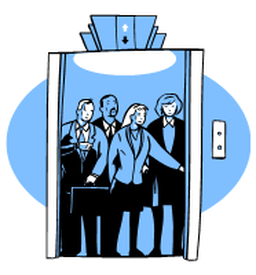 The next thing is to have all your “elevator pitches” prepared, one for each book you have on sale. While some of the people browsing the stall will pick up the book and read the back cover blurb, many of them just pick it up and ask “What’s this book about?” At that point it doesn’t do to be umming and ahing. You have to be ready to tell them about the book in as concise a way as possible. If you aren’t sure what an elevator pitch is, or how to compose one, Google one of the many blogs on the subject. Here’s one we found, but there are many others. https://www.wordstream.com/blog/ws/2022/08/16/elevator-pitch-examples-templates You should have elevator pitches ready anyway, even if you don’t plan to attend any book fairs, because people will ask about your books if they know you are an author. One of our authors once sold a book at a wedding she was attending, based solely on her elevator pitch.  Which brings us to stories. Not the story that is told in the book, that has already been covered above. No, I mean the story of how the book came to be written. Readers love those stories and once they’ve heard them it is far more likely that they will buy the book (but there is no guarantee). Bob has a very good story about how he came to write the biography of his father’s war service. That story has sold him more copies of the book at book fairs than any of his other titles. Then he tells the customers about how that biography inspired his Carter’s Commandos fiction series, and that sells copies of those books. Next you have to be able to deal with all the usual annoying “Would I like this?” sorts of questions that authors always get. And you have to be able to respond without sounding sarcastic. The best way our author found of responding was to reply with a question of his own, such as “What sort of books do you usually read?” 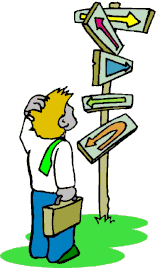 Be prepared to grasp at any straw to connect their reply to your book. It doesn’t matter how far removed from your genre their preferences may seem, making a connection of some sort could lead to making a sale. But don’t be afraid of directing people to other stalls, where they may find what they are looking for. Some people just don't have an interest in your genre (whatever it is). I’ll talk more about that later in the blog. People love a bargain, so being able to discount the price of your books compared to bookshops and on-line retailers is a big plus. Bob charged about £1.50 ($1.35) below the Amazon list price and was still able to make the same level of royalties as he does on-line. His printed price list shows his price and the Amazon price side-by-side, so people know they are getting a discount (they can also check for themselves). Bob also offers further discounts if people buy more than one book. Know what royalties you expect for each book, how much the books cost you to buy (don’t forget the delivery charges) and price accordingly. 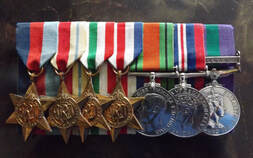 One of Bob's props - his father's medals. One of Bob's props - his father's medals. Take “props” with you because they attract attention and encourage questions. Bob displayed the original cover art for his father’s biography and his father’s medals but on other stalls he saw artefacts that relate to fantasy, sci-fi and horror genres. There are internet retailers that sell that sort of stuff, so making a small investment is often worthwhile. If nothing else they are conversation starters and conversations sell books. Other things to think about. Display is a critical part of attracting attention to your books. Not only must the browsing public be able to see the cover, but they should also be able to see the blurb. Bob uses upright stands (available online) to display the book’s cover and lays a copy out flat in front of it showing the back cover blurb. Some sellers print fliers that show the same information, but Bob noticed that fliers often fly away when the wind blows. Books don’t do that. Some sellers also use boxes or small bookshelf units to raise the height of the books. Maybe this is something that you will want to play around with at home to see what works best for your books, when placed alongside other promotional materials such as props. Getting stuff up to peoples’ eye level often helps with sales. Take some freebies and giveaways with you. Bob takes some bookmarks that a colleague made for him. These are handed out to people regardless of whether or not they buy a book. 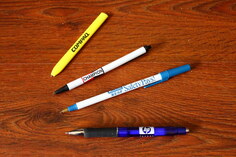 Cheap pens with the title of your book, your name or your website details printed on them are another good giveaway. They can be bought for as little as 20p (about 16c) each, but you have to buy in bulk. Make sure you have plenty of business cards to place on the stall. Even if you don’t sell a book, the browsing public will take something away with them and they may check out your titles later. And slip a business card inside each book, to be found later. This is especially important if you write series. If you don’t have any business cards, they can be purchased on-line from companies such as Vistaprint. You should always carry business cards anyway, because everyone you meet is a potential customer - they just don't know it until you tell them about your book. Another useful marketing tool is to have small bags into which to put purchased books, with a book title, author name or perhaps a cover image on the outside. In these environmentally conscious times, make sure the bags are made of paper, not plastic. Branded bags are expensive, so buy cheap plain brown paper ones then buy a separate roll of stick on labels with your message printed on them and apply one to the other before you go. Bob bought his bags on Amazon and his labels from Stickythings Limited and the total cost was another £50 ($40). 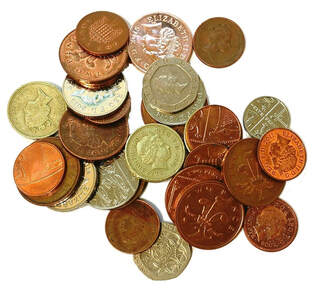 Bob also bought a tablecloth with our Selfishgenie branding on it (see photo above - we paid some of the cost as it is part of our marketing). It wasn’t cheap, but the cost can be recouped over several book fairs. Take plenty of small change with you. You don’t want to lose a sale because you haven’t got change for a £20 note. Make sure you have a way of accepting credit cards, debit cards, Applepay etc. There is no point in losing a sale because you only take cash. There are a number of companies that provide Bluetooth connected card readers these days and their charges are quite reasonable if you are going to attend a lot of book fairs or “meet the author” events. Bob Cubitt uses Sumup. There is also a long list of sundry items that you might need to have with you. Bob has a checklist he uses before he leaves home, just to make sure he has everything. You can download a copy (yes, it’s free) at the end of blog.  One of the big opportunities offered by book fairs is networking with other authors. They know things that you don’t, and you know things they don’t. Find out about the sorts of books they sell and if that turns out to be the genre your browsing members of the public read, don’t be shy about pointing them in the direction where they can find the right sort of books. And make sure that the authors on other stands know about your books, if they haven’t stopped by to find out for themselves. Ask them about other book fairs they’ve been to and note down the details. Also discuss writers’ groups, both in real life and virtual ones. Other authors are your allies, not your rivals. So, that was our quick whizz around the world of book fairs and other book selling events. If you have any questions, feel free to ask them in the comments section or you can email us at the address on our “Contacts” page. if you have enjoyed this blog, or found it useful, be sure not to miss future editions. Just sign up to our newsletter to be kept up to date. We'll even give you a free ebook if you do. Here’s a few websites for Indies who live in the UK (and one for Indies who live elsewhere). http://smallpublishersfair.co.uk/book-fair-calendar/ https://www.casita.com/blog/uk-book-fairs-you-should-check-out https://www.oxfordindiebookfair.co.uk/ https://10times.com/publishers-fair https://fromesmallpublishersfair.co.uk/ https://www.newarkbookfestival.org.uk/ Multiple nations: https://publishersarchive.com/2023-book-events.html Children’s books: https://www.theschoolrun.com/best-childrens-literary-festivals-uk Black History Month: https://curlytreats.co.uk/2023-uk-black-history-month-events/black-british-book-fair/ For people in the North West of England (or who can get there easily), try this Facebook page. This Facebook page deals in book signing events, which are just another form of book fair. And the download of Bob's book fair checklist:
0 Comments
Leave a Reply. |
AuthorThis blog is compiled and curated by the Selfishgenie publishing team. Archives
June 2025
|
||||||
 RSS Feed
RSS Feed